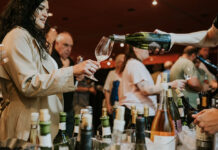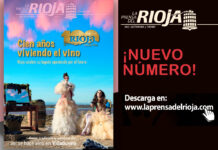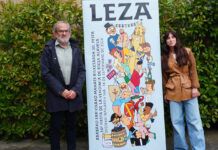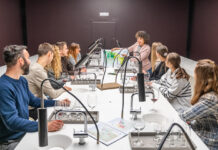Summit, businesswoman and communicator Blanca Benito Padilla is committed to a communication of nearby wine, an accessible language, without elitisms or technicalisms and highlights Rioja's whites and pink as a great potential still to discover
Text: Mirian Terroba
redaccion@laprensadelrioja.com
In the world of wine and social networks, there are names that stand out for their passion, knowledge and ability to connect with people. One of those names is the Blanca Benito Padilla @bb.wineandlife, a sommelier, businesswoman and communicator who disseminates the culture of wine to its more than 22,000 followers from an innovative and accessible perspective.
When ten years ago he studied sommelie, he discovered a world in constant learning. The passion for the elaboration of the wine and the effort behind each bottle captivated him, he tells us. Her experience took her to France, where she lived eight years and deepened in viticulture, participating in harvests and knowing closely the challenging work of the winemakers. He wanted to help these passionate people who live from wine, and thus BB was born. Wineandlife and then Vinai.
P - As a sommelier and expert in wines, what characteristics would you highlight from Rioja wines that make them unique compared to other denominations of origin in Spain?
R - Rioja wines have experienced a very interesting evolution in recent years. Currently, a lower influence of the wood and a greater expression of the terroir is sought, which has resulted in a great diversity of styles. Personally, what I like most is that they are now cooler, light and balanced wines, always maintaining their fruity character.
Q - In your opinion, how has the perception and popularity of Rioja wines evolved both nationally and internationally in recent years?
R - Rioja has always been recognized as one of the main wine regions of Spain. However, for a while, the perception was somewhat stagnant, focused mainly on the great wineries and their emblematic reserves. In recent years, he has managed to reinvent and adapt to current tastes, giving visibility to small wineries that make innovative and very high quality wines. Today, the diversity, quality and unique personality of each winery and terroir have aroused greater interest, encouraging consumers to continue exploring the region.
P - Rioja is known for its red wines, but also produces white and pink. How do you value the diversity of styles in this denomination and what opportunities do you see for the least traditional wines in the area?
R - Rioja's white wines have acquired a great personality in recent years, with innovative and differentiating proposals. An example of this is Bodegas Feco, with its white wine of early harvest and carbonic maceration. I think it would be interesting to continue betting on this type of elaborations in small exclusive productions. As for the pinks, I am a firm defender of his potential in Rioja. Here they are made with the same dedication as a reserve wine, and I especially like onion color, which combine rough grapes with white. I consider that the market is increasingly interested in this pink profile and that it deserves greater impulse.
Q - What current trends in the wine do you think are marking the future of the industry, especially in traditional regions such as Rioja?
A - Currently, more light, balanced wines tend to be made, with less wood and greater expression of the terroir. It is sought that within the same region each wine has its own identity, something that Rioja is developing very well. The region continues to maintain its traditional character and international prestige, but at the same time it is innovating and adapting to the new tastes of the market without losing its high quality standard.
Q - Could you recommend any wine or winery from Rioja that you consider essential for wine lovers?
R - I admire the work of two innovative wine growers in Rioja. Clemente García elaborates wines with breeding in mud jars, which gives them a unique character within the region. I would also highlight José Gil's project, a young couple who produces exceptional place wines.
P - For those who start in the world of wine, what advice would you give them to appreciate and understand the wines, especially those of regions such as Rioja?
R - The first thing I would tell you is that they follow me on Instagram where I share advice and the culture of wine, hahaha! Jokes apart, the most important thing is to know the story behind the wine to understand it better: learn about the region (Rioja Alta, Alavesa, Oriental), the grape varieties (Tempranillo, Garnacha and the interesting work that is being done with Mazuelo) and the types of elaboration (young people, young, reserves ...). Once that theoretical basis is acquired, the ideal is to go into practice, tasting calmly and enjoying each sip, always remembering the story behind each wine.
Closeness, a casual tone and humor
P - As a communicator on platforms such as Instagram and Tiktok, how do you see the role of social networks in the dissemination of wine culture and in the education of new consumers?
R - Having lived in France, I have been able to verify that there the culture of wine is much more entrenched than in Spain. There are still many people who do not know how to differentiate between a variety of grapes and a denomination of origin. Therefore, I consider the educational work in social networks key, helping consumers to discover the potential of wine and encouraging them to try new experiences without fear.
Q - What motivated you to adopt a didactic and fun approach, and how do you think communication on wines has evolved in the last decade?
R - I did not want my communication to be snob or inaccessible. My goal has always been to transmit closeness, so I bet on a casual tone and humor, because I think everything is better understood if it is explained in a pleasant way. For years, the culture of wine has been surrounded by an elitist image and with a complex terminology, which has moved many consumers away. Fortunately, this is changing, and more and more professionals bet on a simple and accessible language for all.
P - What role do you think the specialized press in the sector currently plays?
R - It is essential to maintain relevance and rigor in the wine industry. The Generalist press no longer usually covers the problems and challenges of the sector, although wine is an essential part of our gastronomy and a key piece in tourism, which represents a great contribution to our GDP. Spain is one of the three world world powers, and yet, it is not always given the visibility it deserves. Therefore, the role of specialized media is crucial to inform and preserve this tradition and culture.
P - You are founder of Vinai. Could you tell us more about this project and what objectives pursues?
R - Vinai was born with a clear objective: to help wine growers and winemakers to manage traceability, paperwork and administration, which are usually tedious and remote tasks of the passion to make wine. We create the first "all in 1" platform, which covers from traceability to sale, optimizing processes so that the data is registered only once and automatically sent to the different agencies, as regulatory advice and administrations. We have also developed an application for regulatory and distributors. Our obsession is to facilitate the life of the producers, so we always say: "Tell me what you need, and we will."
Q - As an entrepreneur in the world of wine, how do you see the role of women in the sector?
A - In this sector there are great talented women in various fields, from viticulture to oenology, innovation, communication, wine tourism, sales, sommelier ... We are more and more entrepreneurs who assume the challenge and the difficulties of creating our own project in this world as exciting as wine. Female leadership is marking the way and redefining the rules.

















